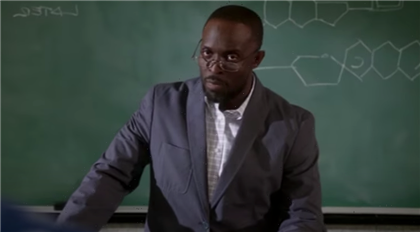
In Season 3 of “Community,” the study group takes a class from biology professor Dr. Marshall Kane, played by Michael K. Williams. Prof. Kane is an ex-con who earned his degree while in prison.
In other words, Kane has seen some things. But nothing prepared him for the baffling changes in the world when he got out. Specifically, “as someone who just spent the majority of his life in prison, what happened with Legos? They used to be simple. Something happened out here while I was inside. Harry Potter Legos, Star Wars Legos. Complicated kits, tiny little blocks. I’m not saying it’s bad, I just wanted to know what happened.”
Prof. Kane is honestly baffled and looking for an answer. And Williams plays this scene with complete sincerity — which is where the hilarity lies. Because the idea is absurd, but he’s absolutely right. Legos have changed.
Williams will always be known first and foremost for his scene-stealing turns as some of the most gripping characters in TV history, including Omar in “The Wire” and Chalky White in “Boardwalk Empire.” But even in his more lighthearted roles, Williams brought a sly intensity that instantly stood out — even in a sea of comedic actors.
“I don’t know what to say, sympathies to his loved ones and everyone that got to work with him,” “Community” creator Dan Harmon wrote on social media, while sharing another iconic moment featuring Williams on the show: When he defends the value of the pinky swear: “Man’s gotta have a code!” Added Harmon: “Wherever he is, I hope Legos are simple again. I hope to join him there and write more silly things for him to say.”
Harmon was a fan of Williams on “The Wire,” and jumped at a chance to bring the star to “Community.” The casting of Williams came first, and then a character was created to find a way to bring “Omar” to Greendale Community College. Williams was only available for three episodes, due to his commitments on “Boardwalk Empire,” but it was a memorable, if all too brief, run.
“I want to add a layer of intensity to ‘Community,’” Harmon told me on stage at the San Diego Comic-Con in 2011, as he announced the guest casting. “If we’re too cartoonish sometimes, then let’s add the opposite of cartoonish. Let’s add a little element of ‘The Wire’ to ‘Community.’”
After “Boardwalk Empire,” Williams appeared in “The Spoils Before Dying” as “Rock Banyon,” a jazz pianist-turned-private eye who winds up being accused of murder. Williams starred with Kristen Wiig and Kate McKinnon in IFC’s satiric miniseries, from Funny or Die. The actor also appeared with the two of them as an FBI agent in 2016’s “Ghostbusters,” enthusing to Entertainment Weekly about working with the franchise’s ghostly green blob Slimer, and calling it a dream come true.
Williams’ experience with Funny or Die also included the parody “The Wire: The Musical,” in which he reimagined Omar as a song and dance man.
In the late 2010s he took on another role in that quirky crossroads between drama and comedy, with SundanceTV’s “Hap and Leonard.” For three seasons he played Leonard Pine, opposite James Purefoy, in the show adapted from the novels of the same name by Joe R. Lansdale. The unlikely friends team up on an adventure to find lost treasure but soon get caught up in even crazier situations with a parade of Deep South eccentrics. It was a fun ride for Williams, who appreciated the “nice, steady job.”
Later, Williams appeared on an episode of Greg Garcia’s subversive anthology series “The Guest Book,” made a cameo on “Last Week Tonight With John Oliver,” and provided the voice of Smokey Greenwood in Netflix’s adult animated series “F Is for Family.”
Of course, those comedy roles were overshadowed by his critically acclaimed dramatic turns on projects including “When They See Us” and “Lovecraft Country,” for which he’s Emmy nominated this year as supporting actor in a drama.
Nevertheless, there were producers who appreciated Williams’ comedic chops, and thankfully he had a chance to showcase them multiple times, particularly over the last decade. But Williams also knew he’d always have to contend with being typecast as Omar, and it’s something he cleverly addressed in this 2018 video he made for HBO and The Atlantic. But it’s also incredibly poignant now, especially at the very end. That’s the genius of Michael K. Williams: Even when he made you laugh, he had the ability to break your heart.
Source: Read Full Article